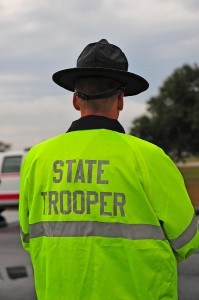 Two Vermont State Police troopers who went to the wrong house when asked the check on the welfare of an elderly woman can be sued over her death from hypothermia, the state Supreme Court has ruled.
Two Vermont State Police troopers who went to the wrong house when asked the check on the welfare of an elderly woman can be sued over her death from hypothermia, the state Supreme Court has ruled.
Troopers Travis Valcourt and Francis LaBombard III went to the wrong house on Augur Hole Road in Marlboro when the daughter of Gladys Kennery, Lorraine Kennery of White Plains, N.Y., called and asked them to make sure her mother had made it home OK form a doctor’s appointment on March 15, 2007, court papers said.
The troopers later told the younger Kennery that no one was home when they checked. The elder Kennery was found by a postal worker the next day on her back porch, suffering from hypothermia. She died at a hospital 12 days later.
Gladys Kennery’s estate sued the troopers and the Department of Public Safety for negligence and gross negligence.
Windham Superior Court Judge John Wesley dismissed the case, agreeing with the state’s lawyers that the troopers were protected by sovereign immunity, a legal doctrine that says government employees are protected from lawsuits for mistakes made in the normal course of their duties.
The Supreme Court, in a 5-0 decision issued Wednesday, disagreed. “The troopers had a common law duty of care,” the high court ruled. “A reasonable trier of fact could conclude they did not exercise due care in performing the welfare check.”
Brattleboro lawyer Thomas Costello, who represented the dead woman’s estate, told The Burlington Free Press the ruling means police will be held more accountable for their conduct in the future.
“It’s a magnificent decision,” Costello said. “This is going to make a difference in the way law enforcement conducts itself. What the court is saying is they are not above the law.”
Attorney General William Sorrell said that by at least partially piercing the armor of sovereign immunity, the decision will raise costs for taxpayers. The state is self-insured and will need to set aside more money for possible payouts in such cases in the future, he said.
“This opens the door on the state’s part for more liability going forward,” Sorrell said. “It means if you sue the state and have evidence that’s compelling enough to meet the standard set for a jury or fact-finder, there is more liability than there has been to date, and that means more of the taxpayers’ money might be awarded to plaintiffs.”
Was this article valuable?
Here are more articles you may enjoy.

 Red Flags Adjusters Should Look for in Truck Accident Claims Investigations
Red Flags Adjusters Should Look for in Truck Accident Claims Investigations  Tesla’s Austin Robotaxis Report 14 Crashes in First Eight Months
Tesla’s Austin Robotaxis Report 14 Crashes in First Eight Months  Walmart to Pay $100 Million to Settle FTC Case on Driver Wages
Walmart to Pay $100 Million to Settle FTC Case on Driver Wages  ‘Structural Shift’ Occurring in California Surplus Lines
‘Structural Shift’ Occurring in California Surplus Lines 